Related Research Articles

A football chant or terrace chant is form of vocalisation performed by supporters of association football, typically during football matches. Football chanting is an expression of collective identity, most often used by fans to express their pride in the team or encourage the home team, and they may be sung to celebrate a particular player or manager. Fans may also use football chants to slight the opposition, and many fans sing songs about their club rivals, even when they are not playing them. Sometimes the chants are spontaneous reactions to events on the pitch.

Ayr United Football Club are a football club in Ayr, Scotland, who play in the Scottish Championship, the second tier of the Scottish Professional Football League. Formed in 1910 by the merger of Ayr Parkhouse and Ayr F.C., their nickname is The Honest Men, from a line in the Robert Burns poem "Tam o' Shanter". They play at Somerset Park.
"God Save Ireland" is an Irish rebel song celebrating the Manchester Martyrs, three Fenians executed in 1867. It served as an unofficial Irish national anthem for Irish nationalists from the 1870s to the 1920s.

The Real McKenzies is a Canadian Celtic punk band founded in 1992 and based in Vancouver, British Columbia. They are one of the founders of the Celtic punk movement, albeit 10 years after The Pogues.

The Scotland national football team represents Scotland in men's international football and is controlled by the Scottish Football Association. It competes in the three major professional tournaments: the FIFA World Cup, UEFA Nations League and the UEFA European Championship. Scotland, as a country of the United Kingdom, is not a member of the International Olympic Committee, and therefore the national team does not compete in the Olympic Games. The majority of Scotland's home matches are played at the national stadium, Hampden Park.
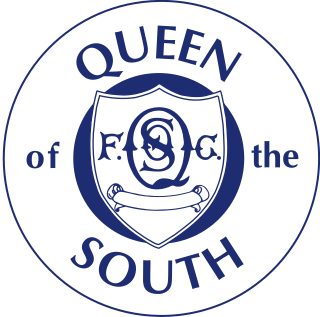
Queen of the South Football Club is a Scottish professional football club formed in 1919 in Dumfries. The club plays in Scottish League One, the third tier of Scottish football. They are traditionally nicknamed the Doonhamers but are more usually referred to as Queens or QOS. Their home ground is Palmerston Park.
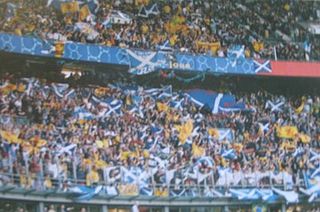
The Tartan Army are fans of the Scotland national football team. They have won awards from several organisations for their friendly behaviour and charitable work. They have also been criticised at times for aspects of their behaviour, however, such as indecent exhibitionism and jeering at "God Save the Queen".
Alistair Reid "Ally" MacLeod was a Scottish professional football player and manager. He is perhaps best known for his time as the Scotland national football team manager, including their appearance at the 1978 FIFA World Cup. MacLeod played as a left winger for Third Lanark, St Mirren, Blackburn Rovers, Hibernian and Ayr United. He then managed Ayr United, Aberdeen, Scotland, Motherwell, Airdrieonians and Queen of the South.
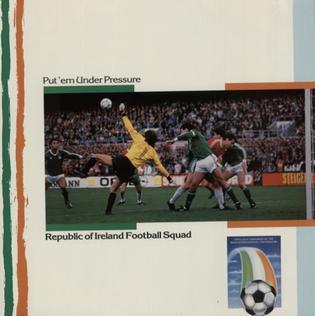
"Put 'Em Under Pressure" was the official song to the Republic of Ireland national football team's 1990 FIFA World Cup campaign in Italy.

Clan Morrison is a Scottish clan. The Highland Clan Morrison is traditionally associated with the Isle of Lewis and Harris (Leòdhas) around Ness (Nis), Dun Pabbay, and Barvas (Barabhas), lands in Sutherland around Durness, and in North Uist. There are numerous Scottish clans, both Highland and Lowland, which use the surname Morison or Morrison. In 1965, the Lord Lyon King of Arms decided to recognise one man as chief of all Morrisons, whether their clans were related or not.
Richard Asa Hartford is a Scottish former football player and coach. He started his professional career with West Bromwich Albion. His early progress led to a proposed transfer to Leeds United in November 1971, but this collapsed when a medical examination discovered a heart condition. Hartford instead moved to Manchester City in 1974. He helped City win the 1976 League Cup Final. After a brief spell with Nottingham Forest, Hartford moved to Everton in 1979 and then had a second spell with Manchester City. After playing for Fort Lauderdale Sun, Hartford joined Norwich City. His shot resulted in the only goal of the 1985 League Cup Final.

A Shot at Glory is a film by Michael Corrente produced in 1999 and released in 2002, starring Robert Duvall and the Scottish football player Ally McCoist. It had limited commercial and critical success. The film features the fictional Scottish football club Kilnockie FC, based on a Second Division Scottish Football League club, as they attempt to reach their first ever Scottish Cup Final. The final game is against Rangers.
Andrew Graham Cameron MBE is a Scottish comedian, television and radio broadcaster.
The history of the Scotland national football team dates back to the first ever international football match in 1872. Until the Second World War, Scotland mainly competed against the other Home Nations in the British Home Championship, with the most keenly contested fixture being the match with England. The Scottish Football Association, which governs the team, joined the international governing body FIFA in 1910, but along with the other Home Nations withdrew from FIFA in 1928. This meant that Scotland did not participate in the World Cups of 1930, 1934 or 1938. The Home Nations rejoined FIFA after the Second World War and Scotland then started to participate in international competitions. Scotland have since participated in eight World Cups and three European Championship tournaments, but have never progressed beyond the first stage.
David Steel Stewart was a Scottish footballer, who played as a goalkeeper. After winning the Scottish Junior Cup with Kilsyth Rangers he was signed by Ally MacLeod's Ayr United for whom he played in two senior cup semi-finals. He then signed for Don Revie at Leeds United where he played when Leeds lost 2–0 to Bayern Munich in the 1975 European Cup Final. He signed for Ron Atkinson at West Bromwich Albion but didn't play for their first team. He then won promotion to the top flight of English football in his first season at John Toshack's Swansea City. Stewart saved a penalty in his one appearance for the Scotland national football team, a 1–0 defeat in East Germany in 1977.
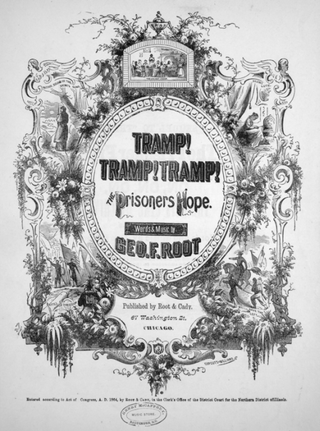
"Tramp! Tramp! Tramp! " was one of the most popular songs of the American Civil War. George F. Root wrote both the words and music and published it in 1864 to give hope to the Union prisoners of war. The song is written from the prisoner's point of view. The chorus tells his fellow prisoners that hope is coming.
"One team in Tallinn" refers to a football match scheduled for 9 October 1996 in World Cup qualifying European Group 4 between the national teams of Estonia and Scotland. The match was abandoned after three seconds because the Estonian team were absent from the Kadrioru Stadium due to a dispute over its floodlights. Scotland expected to be awarded a walkover victory, but FIFA ordered that the match be replayed on neutral territory. The replayed match, staged at the Stade Louis II in Monaco, ended in a goalless draw.
"We Have A Dream" was a special single released as the official song of the Scotland national football team for their 1982 World Cup Campaign. When first released, it reached number 5 in the UK Singles Chart.
The Scotland national football team has appeared eight times at the FIFA World Cup, including five consecutive tournaments from 1974 to 1990. The team has never advanced beyond the first round of the finals competition. They have missed out on progressing to the second round three times on goal difference: in 1974, when Brazil edged them out; in 1978, when the Netherlands progressed; and in 1982, when the Soviets qualified.
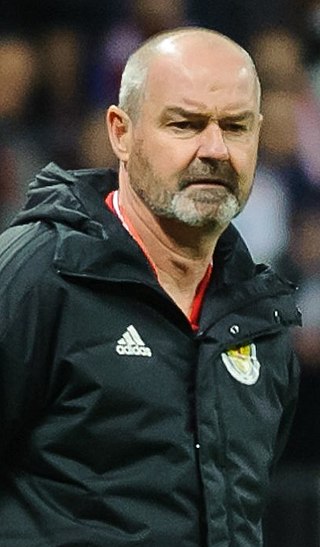
The role of a Scotland national football team manager was first established in May 1954, when Andy Beattie was appointed. Beattie took charge of six matches before and during the 1954 FIFA World Cup, when Scotland competed at their first major tournament. Twenty-four men have occupied the post since its inception, with Beattie, Jock Stein and Alex McLeish occupying it in two spells. Six of those managers were in caretaker or interim roles. Craig Brown held the position for the longest to date; a tenure of 9 years, comprising two major tournaments and a total of 71 matches.
References
- ↑ The Filter. "The five best World Cup songs (Three Lions not included)". Telegraph. Retrieved 23 June 2014.
- ↑ "Argentina 78: When the nation went mad for Ally's Army". The Scotsman. Retrieved 23 June 2014.
- ↑ "Seven deadly sins of football: Pride - Ally MacLeod to Lord Cisse | Football | The Observer". Theguardian.com. Retrieved 23 June 2014.
- ↑ "Top Ten anthems | Sky Sports | Interactive | Top Tens". Sky Sports. 20 December 2011. Retrieved 23 June 2014.